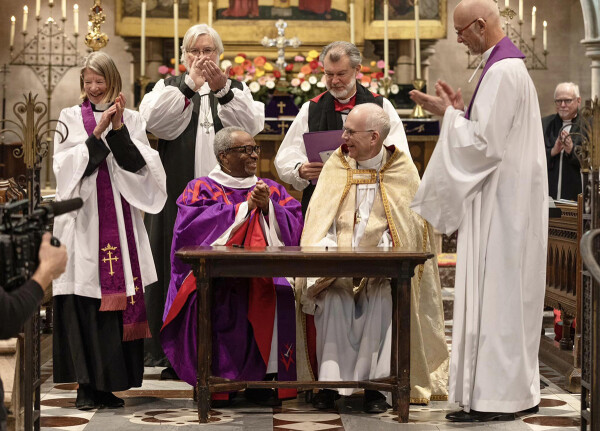Church of Sweden and The Episcopal Church
Our Full-Communion Relationship with the Church of Sweden, and the signing of the
Memorandum of Understanding ("The Paris Agreement")
between the two churches, was celebrated at a
festive Eucharist on March 27, 2023 at 11h00 in the Cathedral of the Holy Trinity in Paris
This service was live-streamed and is available for viewing on the Cathedral YouTube channel here. The Archbishop's sermon is here.

Presiding Bishop Michael Curry and Archbishop of Uppsala Martin Modéus sign a full communion agreement between The Episcopal Church and the Church of Sweden during a March 27 service held at the Cathedral Church of the Holy Trinity in Paris, France. They are surrounded by from left, the Rev. Margaret Rose, the Rt. Rev. Pierre W. Whalon, the Rt. Rev. Mark Edington, the Rev. Christopher Meakin, and the Ven. Walter Baer in the background. Photo: Jeremy Tackett
On Monday, March 27, 2023, Episcopal Presiding Bishop, The Most Rev. Michael Curry and the Primate of the Church of Sweden, The Most Rev. Martin Modéus, Archbishop of Uppsala, signed the a Memorandum of Understanding establishing a full-communion relationship between the Church of Sweden and the Episcopal Church, known as the "Paris Agreement." The Memorandum of Understanding was ratified by both the General Convention of the Episcopal Church and the General Synod of the Church of Sweden in 2022.
The Full Communion Celebration included many ecumenical guests.
Background
Discussions between the Episcopal Church and the Church of Sweden have continued for over a century, beginning with the 1908 Lambeth Conference of Anglican Bishops resolution commending fuller cooperation between our churches. This work continued in the 1920s with Bishops in Charge of the Convocation, the Rt Rev Gershom Mott Williams and Rt Rev Charles Henry Brent.
The current discussions began in Paris with a meetings initiated by former Bishop in Charge, the Rt Rev Pierre Whalon in 2010, with a meeting between the ecumenical officers and other representatives of both churches. A study document regarding the history of our historic relationship was commissioned. This was in response to a resolution of the 2009 General Convention of the Episcopal Church, directing the Standing Commission on Ecumenical and Interreligious Relations to approach the Church of Sweden about formalizing our long-standing close relationship.
In 2015, both churches churches received the Report on the Grounds for Future Relations between the Church of Sweden and the Episcopal Church prepared by the ecumenical offices of both churches with the assistance of church historians.The Episcopal Church and the Church of Sweden then acknowledged a formal relationship on two occasions in 2015: at the 78th General Convention in Salt Lake City, Utah, USA, on June 28; and on November 18 in Uppsala at the General Synod of the Church of Sweden.
This long-existing relationship was then affirmed and established canonically with the passage of a Memorandum of Understanding (MOU) between the Churches, which was enacted by the 80th General Convention in Baltimore, Maryland, USA, in July 2022. The General Synod of the Church of Sweden accepted and affirmed the same MOU in November 2022. The MOU was signed by Episcopal Presiding Bishop, The Most Rev. Michael Curry, and by the Church of Sweden's Archbishop of Uppsala, The Most Rev. Martin Modéus, at a liturgy on March 27, 2023, in the Cathedral of the Holy Trinity in Paris.
The 2015 report acknowledged a long history of shared church work and life between Swedish Lutherans and Episcopalians, beginning in the colonial period and extending to the present. It also identified the following areas of common mission going forward:
1. In practical work in parishes of The Episcopal Church’s Convocation of Europe and the Church of Sweden Abroad in Europe, where they may share similar challenges as expatriate congregations. In this context there may also be occasions when one church’s members can find a spiritual home in the other, if there is no parish of their own church in the vicinity.
2. In tripartite areas of interest as and when they arise in relation to common partners:
- The Evangelical Lutheran Church in America
- The Iglesia Filipina Independiente
- Old Catholics Churches of the Union of Utrecht
3. In issues of common concern in the strategy and programmatic work of the World Council of Churches.
4. In specific questions which the two churches prioritize, i.e. climate change, peace, gender justice, etc.
The 2015 report noted:
The proposal is not that a new ecumenical agreement on communion between these two churches be written, such as has been the case between a number of Lutheran and Anglican churches. Both the present churches are party to such agreements. Rather this document intends to show that there are historical and contemporary reasons for claiming that the two churches have in practice lived in fellowship with each other at various times, and therefore can be understood to do so today. This is a fact that we wish to acknowledge and celebrate, as the basis for closer cooperation where suitable in the future.
Katharine Jefferts Schori, twenty-sixth Presiding Bishop of The Episcopal Church, encouraged the process leading to the report and its reception, noting that “This is a living partnership which will undoubtedly grow far deeper in coming years, particularly in this season in ministry with migrants, where we meet Jesus in the other.”
At the 2023 signing ceremony, Ärkebiskop Martin Modéus noted in his sermon, "This is church history. And what is more important: it is spiritual history. And what is even more important: it is spiritual future." See the Archbishop's sermon here.
Anglicans and Lutherans also enjoy warm relations internationally through the Porvoo Communion of Europe-based churches. (The Episcopal Church is not a part of the Porvoo Communion.)
